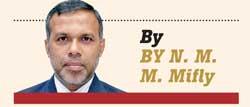Reply To:
Name - Reply Comment

When inflation spikes the purchasing power of people drops
Sri Lanka annually loses in a year more than 125 billion rupees in taxes payable by Sri Lankan residents, owing to cross-border tax abuses as disclosed by Tax Justice Network.
It was reported that India was able to collect 20 billion dollars of taxes two years back from this cross-border tax evasion of its residents through AEoI
 None is willing to part with what one possesses unless the receivable in return is better or equivalent. The receivables could be tangible or intangible. There is no exception to this norm. The payment of tax to the government is not an exception to this norm.What a taxpayer receives in return for the tax he/she pays is a million-dollar question in the Sri Lankan context.
None is willing to part with what one possesses unless the receivable in return is better or equivalent. The receivables could be tangible or intangible. There is no exception to this norm. The payment of tax to the government is not an exception to this norm.What a taxpayer receives in return for the tax he/she pays is a million-dollar question in the Sri Lankan context.
Spoiled by impropriety
Whatever efforts taken by the government to market the tax system as a social responsibility and duty, they are derailed by tax policy blunders. One of the basic and primary principles of taxation is fairness which means the ability to pay the tax.
It is common sense that when inflation increases the purchasing power of people drops as a result of price hiking. As a result, the economy of the country gets contracted. As a way of mitigation, tax reliefs such as an increase of threshold, reduction of tax rates, and a few exclusions and exemptions are generally given at times of economic downturn and inflation.
It was not a prudent tax policy decision that the government adopted –whatever the justifications it had- to reduce the tax thresholds for liability of income tax and VAT and to increase their tax rates at the time of inflation was shot up from 09% to an unprecedented 70% in 2022.
The government could boast that the tax revenue was increased by the new tax laws imposed on the people even though violating the tax principles. The perception of taxation as a legalised robbery by the force of the law is gaining momentum among the public. Such a negative impression of taxation by the people would trigger many adverse consequences on tax revenue collection in the long run.
Hiking tax burden is the only way to increase tax revenue?
It is an undisputed fact that taxes are essential for funding government services and infrastructure. Yet, higher undue tax burdens would trigger detrimental effects such as capital flight and outflow, saving and investment disincentives, brain drain, tax evasion and avoidance, erosion of public trust and confidence in the tax system, and overall economic inefficiency.
The most effective ways to increase tax revenue without enforcing further tax burdens on the existing taxpayers are:
· Expanding the tax base and
· Combating local and cross-border tax evasion.
I do not mean here by an expansion of the tax base, increasing the number of tax files quantitatively but qualitatively. It is a fact that more than 70% of the tax revenue is contributed by nearly 600 files which is less than 1% of the total number of tax files maintained by IRD.
Combating cross-border tax evasion
Countries are globally losing 480 billion US dollars in tax a year due to cross-border tax evasion by Multi-National Enterprises (MNEs) and high-net-worth individuals.
This fact was established by the Tax Justice Network which is an internationally recognised independent institution committed to research on global tax issues and tax evasion. (World to lose $4.8 trillion to tax havens over next decade unless UN tax convention adopted, countries warned - Tax Justice Network)
Penny wise, pound foolish
The portion of tax loss attributed to Sri Lanka was 413.25 million dollars due to cross-border tax abuses. Out of which, Sri Lanka’s MNEs evade 406.56 million dollars while wealthy Sri Lankan individuals evade 6.69 million dollars. The total annual tax loss in Sri Lankan rupees is around 125 billion.
The total income tax revenue from non-corporate (individual) taxpayers including the PAYE tax collected as per the IRD Annual Performance Report of 2022 (IRD Report) was 69 billion rupees which represented nearly 13% of the total IRD income tax collection.
There are around Five hundred and fifty thousand (550,000) individual income taxpayers whose annual tax contribution expected is less than 100 billion rupees for 2024. If the governments were able to collect these tax evasions of cross-border tax abuses by Sri Lanka’s MNEs and wealthy individuals, amazing tax reliefs and concessions could be granted to the non-corporate individual sector including the PAYE taxpayers without an impact on the overall tax revenue.
The annual tax revenue target expected from the current year is 2024 billion rupees. The PAYE tax target is 160 billion rupees while the average income tax revenue expected from individual (non-corporate) taxpayers is around 98 billion rupees based on the IRD Report.
Accordingly, the non-corporate (individual) taxpayers could have been fully exempted from income tax or 78% of the PAYE tax burden could have been lessened, had the government taken the proactive steps to prevent the tax loss of 125 billion rupees of the cross-border tax abuses.
A game changer
The major barrier to tapping this cross-border tax evasion of 125 billion rupees is the absence of political will. Such cross-border tax evasion is successfully handled by other countries by entering into international agreements of Automatic Exchange of Information (AEoI) of the Global Forum.
The AEoI of the Global Forum is an initiative aimed at combatting tax evasion and improving international tax transparency.
The primary goal of AEoI is to prevent tax evasion by ensuring that tax authorities around the world have access to information about financial accounts held by their resident companies and individuals in foreign jurisdictions. This helps in detecting and addressing offshore tax evasion.
The AEoI operates based on the Common Reporting Standard (CRS), developed by the OECD. The CRS sets out the information that must be exchanged and the format in which it should be exchanged.
Under the CRS, financial institutions are required to report information about accounts held by non-residents to the tax authorities. This information includes details such as the account holder’s name, address, taxpayer identification number, account balance, and income generated from the account. The tax authorities then automatically exchange –without the request- this information with the tax authorities of the account holders’ countries of residence.
The AEoI helps to level the playing field by making it harder for individuals and entities to evade taxes by hiding assets and income in foreign jurisdictions. It also promotes fairness in the tax system and enhances global tax cooperation.
Kicking the can down the road
More than 170 countries and tax jurisdictions have so far entered into the AEoI of the Global Forum and taken effective measures for combatting cross-border tax abuses by its tax residents.
Regrettably, Sri Lanka is not yet a signatory of this AEoI due to reasons best known to the political authorities. I do not say that the government has not joined the AEoI of the Global Forum to safeguard corrupt politicians and their cronies.
In addition to this AEoI of the Global Forum, there are other two international agreements for automatically exchanging limited information on tax matters.They are:
Mutual Administrative Assistance in Tax (MAAT) Convention.
Qualifying Competent Authority Agreement (QCAA)
Unfortunately, Sri Lanka is not a signatory of any of such agreements. As a result of this inaction on the part of the government, section 76 of the Inland Revenue Act, No. 24 of 2017- which deals with international transactions-, and the Transfer Pricing Gazette No. 2217/7 of 02, March 2021 become virtually defunct due to non-entering into any convention for automatic exchange of information. No tax jurisdiction automatically exchanges with Sri Lanka, the Country by Country Report (CbCR) of an MNE whose related entity is in Sri Lanka.
The fox calling the wolf sly
Ironically, the same transfer pricing Gazette issued by the government labels other countries as “Systemic Failure” for not having a mechanism in place to effect the automatic exchange of CbCR with Sri Lanka, while Sri Lanka itself has no such mechanism of AEoI whereas many other countries have it.
Due to this “Systemic Failure” of Sri Lanka, no other tax jurisdiction shares with Sri Lanka the CbCR of MNEs, which is an indispensable document for combating cross-border tax evasion of MNEs and for assessing potential risks of Base Erosion and Profit Shifting (BEPS).
The Two Pillar Solution of OECD and the bold decision of the Government.
I wish to commend the government of Sri Lanka for its bold decision of not joining the Two Pillar Solution of OECD while 139 members out of 142 member countries purportedly expressed their consensus to it to “combat” cross-border tax evasion of MNEs. Many countries have now realised it was the white elephant and begun to express their reservations about it.
Many developing countries have now rallied around the initiative of the UN Tax Committee to combat the cross-border tax abuses of MNEs by interpreting and amending articles 12, 12A and 12B of the Double Tax Avoiding Agreements.
This proposed solution of the UN Tax Committee is more practical and beneficial to developing countries rather than the Two Pillar Solution of OECD. Hence, it is paramount for developing countries including Sri Lanka to rally around the UN initiative to strengthen it in this unethical commercial world where a might is treated as right.
Bang for the buck
Due to such inaction and indecision of the government, Sri Lanka annually loses in a year more than 125 billion rupees in taxes payable by Sri Lankan residents, owing to cross-border tax abuses as disclosed by Tax Justice Network.
It was reported that India was able to collect 20 billion dollars of taxes two years back from this cross-border tax evasion of its residents through AEoI. This recovered tax amount is more than 300% of the total tax revenue estimate of Sri Lanka for the year 2024.
Indonesia joined the AEoI of the Global Forum in 2009 and it provided an opportunity for its residents to declare any hidden assets in 2015. As a result of this amnesty coupled with entering into AEoI of the Global Forum, over 900,000 declarants declared their black assets worth 366 billion dollars and paid taxes of 8.6 billion dollars at concessionary rates.
Hence, it is nothing but fitting that Sri Lanka should follow suit of international communities by joining the Global Forum for AEoI and engaging actively with the UN Tax Committee. Thus, the potential cross-border annual tax losses of 125 billion rupees can be prevented and the undue tax burdens imposed on the private and public sector employees and non-corporate (individual) persons can be substantially reduced, without an impact on the estimated tax revenue.
(The writer is the former Deputy Commissioner
General of IRD)
[email protected]